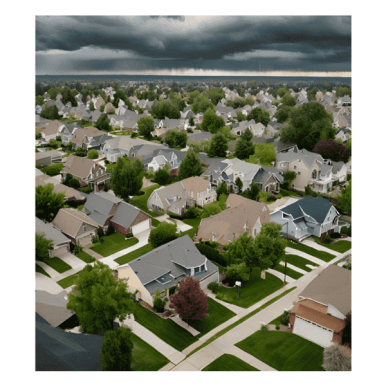Zurich Homes: Europe’s Most Overpriced Market Revealed
A new UBS study highlights Zurich as the priciest city for homes in Europe. Discover the factors driving these soaring property prices.
Zurich has recently been identified as one of the top contenders in the global housing bubble race, according to the latest analysis from UBS. This Swiss city, alongside its exorbitant rental prices, has become increasingly inaccessible for approximately 85 percent of its residents when it comes to homeownership. The question looms: which city is teetering most precariously on the brink of a housing bubble?
Each year, UBS meticulously scrutinizes the housing markets of 25 major cities worldwide to ascertain which locales are most susceptible to bubble-like conditions. The bank characterizes a housing bubble as a “substantial and sustained mispricing of an asset (in this case, housing), the existence of which cannot be proven unless it bursts.”
To gauge the risk levels for each city, UBS employs a multifaceted approach, calculating the average costs associated with purchasing a home, rental expenses, income levels, construction rates, and prevailing market prices within the respective countries. These variables coalesce into a scoring system, where a score between 1 and 1.5 indicates an elevated risk of a housing bubble, while any score exceeding 1.5 signals a city in serious jeopardy.
Housing bubbles typically emerge when property prices become grossly inflated. Low interest rates often entice potential buyers to pursue larger, riskier mortgages, thereby amplifying demand and prompting sellers to further escalate prices. This phenomenon gradually detaches housing prices from rental costs and income levels, culminating in an overvalued market. Should demand wane while the supply of homes gradually increases, the risk of a bubble diminishes. Conversely, a sudden and dramatic decline in both house prices and demand can lead to a bubble “bursting,” resulting in rising mortgage interest rates and potential foreclosures for homeowners who find themselves in financial distress, a scenario reminiscent of the 2008 economic crisis.
Interestingly, fears of a global housing crisis have begun to subside. Following a period of deteriorating scores in 2021 and 2022, UBS has observed a decline in the risk of a global housing bubble over the past two years. While property prices in the United States remain increasingly overvalued, this imbalance has lessened in both Europe and the Asia-Pacific region.
Germany has experienced the most significant improvements; having been labeled the European city most at risk in 2022, Frankfurt's housing bubble has since deflated, now categorized as merely at moderate risk of overvaluation, with home prices plummeting by 20 percent since their pandemic peak. Other cities, such as Munich and Amsterdam, have also shown signs of improvement, albeit still classified within the low to moderate risk spectrum.
Despite relinquishing its top position, Zurich remains the European city with the most overvalued housing market. Alongside Miami and Tokyo, it is one of three cities categorized as being at “high” risk of a housing bubble. UBS's report highlights that, over the past five years, house prices in Zurich have surged faster than in any other European city, with a staggering 20 percent increase since 2019. Notably, despite the recent uptick in Swiss mortgage costs, property prices have remained resilient.
Housing affordability in Switzerland presents a challenging landscape, albeit not the most dire globally. With net incomes rising only modestly, the dream of homeownership in Zurich is increasingly elusive, with estimates suggesting that a mere 15 percent of the population can afford to purchase a home. The prospect of buying to rent is equally daunting, as the report indicates that it would take an astonishing 41 years of rental income from a property in Zurich to recoup the initial investment.
However, due to the high salaries associated with employment in Zurich, the city does not rank as the least affordable globally. The report reveals that a skilled service worker in Zurich would require an average of eight years' salary to afford a 60-square-meter apartment, in stark contrast to 22 years in Hong Kong, 13 years in Paris, and 12 years in London.
In a related note, Geneva also finds itself among the top ten cities at risk, positioned sixth on the list, with home prices having risen by 10 percent over the past five years, although stagnation has been observed in recent years. This, coupled with rising rental costs, has contributed to a diminished risk of a bubble in the city.
Ultimately, UBS concludes that due to persistently low housing availability, a burgeoning economy, and robust population growth, the costs associated with both renting and purchasing in Zurich and Geneva are likely to continue their upward trajectory. The bank posits that, in Zurich, the scarcity of owner-occupied homes will increasingly render them a luxury commodity, elevating their status as symbols of affluence.
The cities most at risk of a housing bubble in 2024 are as follows:
1. Miami, United States (1.79)
2. Tokyo, Japan (1.67)
3. Zurich, Switzerland (1.51)
4. Los Angeles, United States (1.17)
5. Toronto, Canada (1.03)
6. Geneva, Switzerland (1.00)
7. Amsterdam, the Netherlands (0.98)
8. Sydney, Australia (0.78)
9. Boston, United States (0.78)
10. Vancouver, Canada (0.77)
RELATED CONTENTS
Greece: Europe’s Fourth Cheapest Real Estate Market
Explore why Greece stands out as one of Europe’s most economical real estate markets, attracting savvy...
Surge in Scottish Home Sales: UK Real Estate Update
Scottish home sales and enquiries surged in October, with a third of surveyors reporting the fastest growth...
Spain: A Leading Market in European Real Estate
Explore how Spain is becoming one of Europe's most promising real estate markets, excelling in retail,...
Greece Real Estate Market: Rise of Serviced Apartments
Explore the growing demand for serviced apartments in central Athens, where integrated hospitality services...
Home Prices Hit by Climate Change, J.P. Morgan Warns
J.P. Morgan analysts reveal a negative link between climate risk and home price appreciation. Explore the...
Renting in Spain: Prices Finally Decline
The cost of renting in Spain trends downwards, averaging €13/m². Discover insights on this shift after...
Canada Real Estate Market: Rents Drop for First Time in over 3 years
For the first time in over three years, average asking rents in Canada fell 1.2% in October, reaching...
Fewer Than 2% of Dutch Homes Sold to International Buyers
Analyze the decline in international purchases of Dutch houses, revealing key factors influencing this...
Donald Trump’s Victory May Boost London Property Demand
Knight Frank analyzes how Donald Trump’s election win could increase demand for prime London properties....

